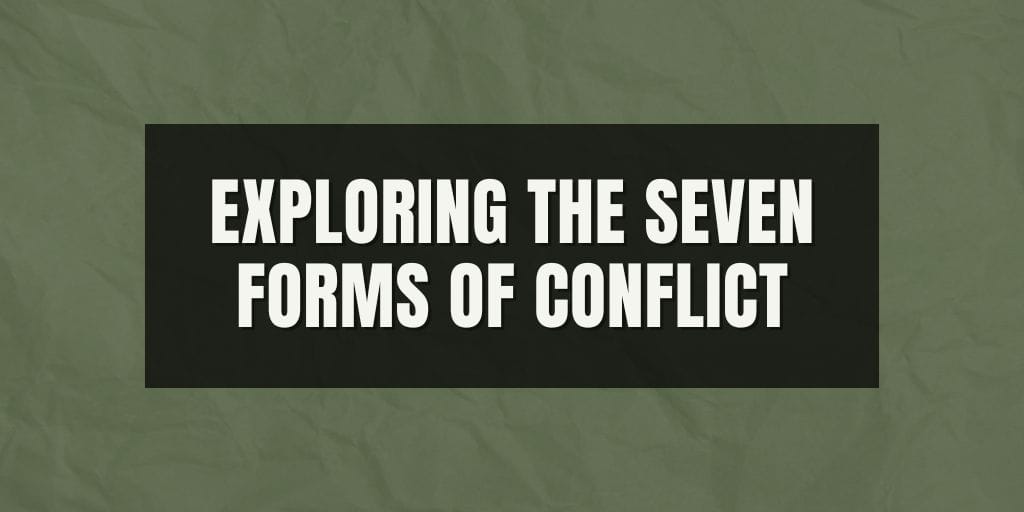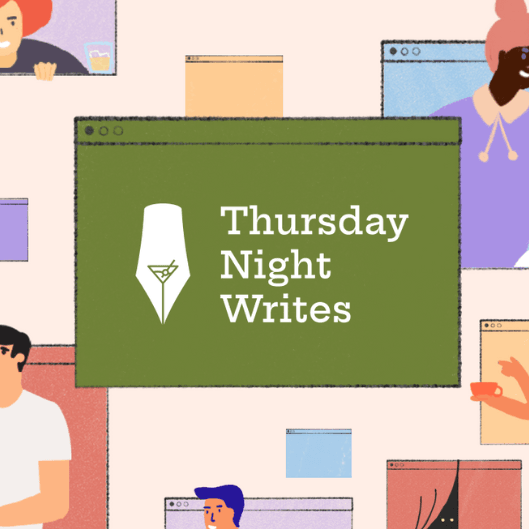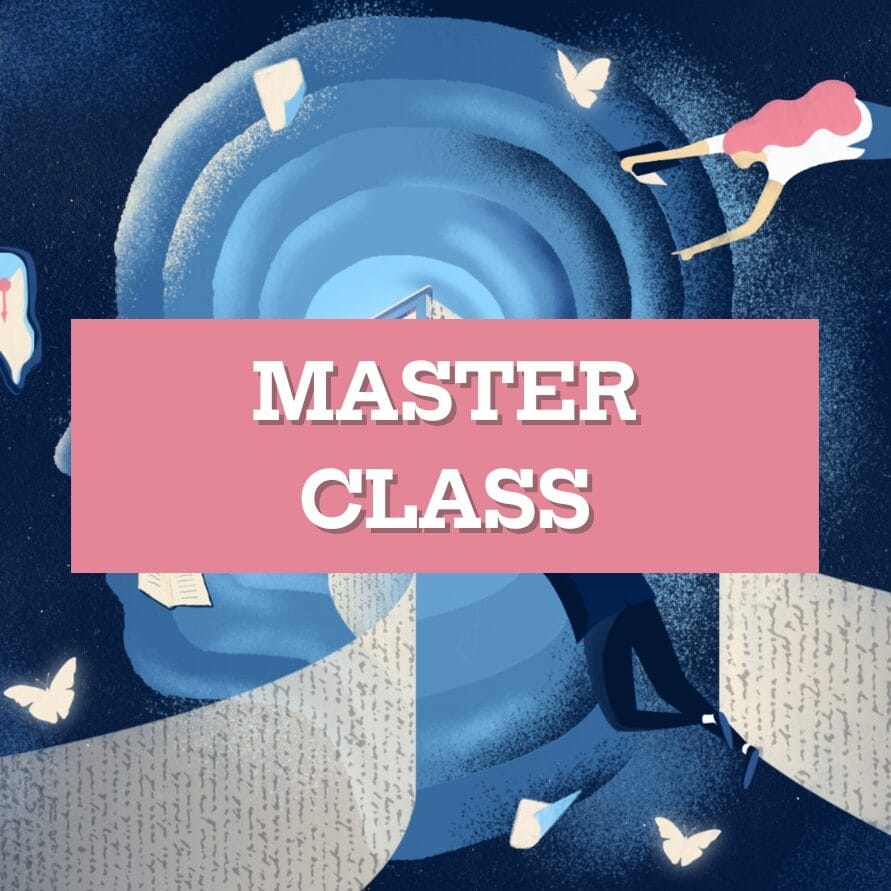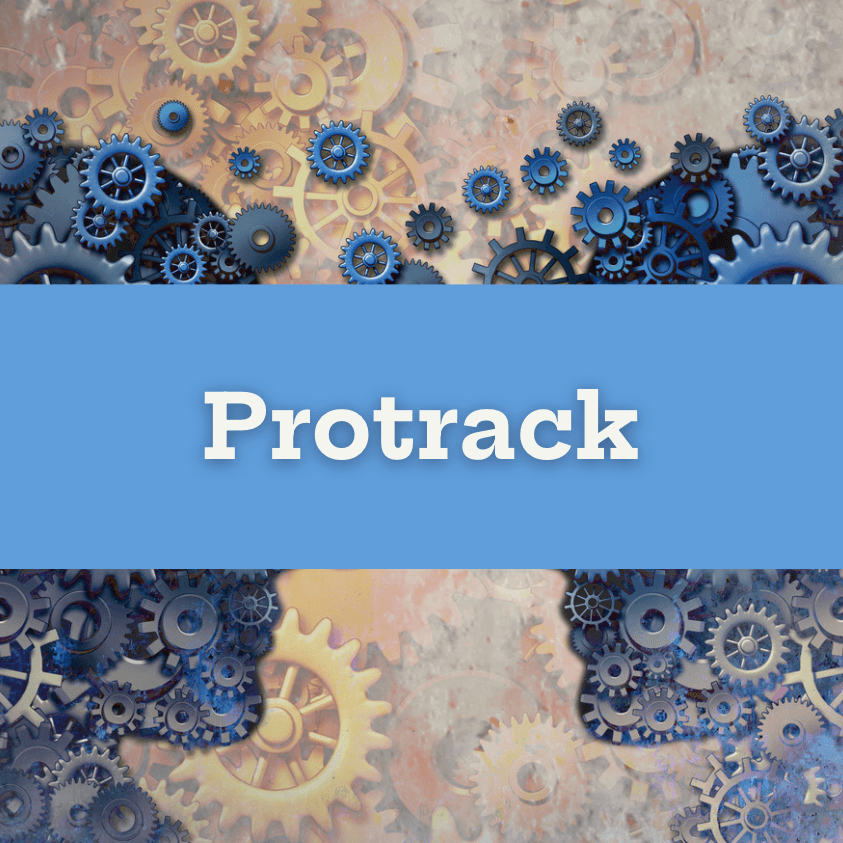As many of you know, every Thursday Night, we host a free screenwriting class called Thursday Night Writes. A recent installment with Steve Molton was so groundbreaking that we decided to release it as a podcast for our whole community. Enjoy!
Jake: Hello, everybody, welcome to Thursday Night Writes! Our guest tonight is Steve Molton.
Steve is a former HBO and Showtime executive, Columbia film school professor, and Pulitzer nominee. He wrote a movie with Frank Pugliese of House of Cards. He wrote limited series for Showtime. He has worked in television, novels, nonfiction, and film. He’s even penned an opera!
He’s also just one of the great human beings in the world and a good friend. We’re so lucky to have him back on our team, mentoring students in our ProTrack program and offering a new TV Drama Writers Room.
Steve and I are going to be exploring the concept of internal antagonists in screenwriting and the role they play in your character’s journey.
Often, when we’re thinking about the “antagonist” or the opposing forces in our script, we think about the “bad guy” or the “obstacle.”
But today, we’re going to focus on internal obstacles, things that get in the way of our characters on the inside, and the things that get in the way of us as writers on the inside.
Steve: Part of the reason I wanted to do this subject tonight is that, having walked the picket line in the last year, we were besieged by the notion that somehow machines will be able to replicate what we do.
But as some great person had written on his sign while picketing, “Computers can’t have childhood trauma.”
We are still human beings. The fact that we live and die, that we are shaping the world and must still shape the world, sometimes in ways to protect ourselves, requires us to go really deep. So that’s what we’ll do today, working from the inside out.
I’ve been teaching at the French National Film School, doing a masterclass there for producers. These weren’t people who were naturally thinking like writers, although they were storytellers of a kind.
I pulled together notes from a series of talks I did there on the seven forms of conflict.

There are seven forms of conflict that drive just about every great story.
Writers have probably heard about the seven forms of conflict. We forget them because they’re so common and ubiquitous. They are:
1) The self versus the self
2) Self versus another
3) Self versus society
4) Self versus technology
5) Self versus nature
6) Self versus the supernatural
7) Self versus God, fate, or destiny
The first three of these are present in almost all strong movies and stories. The last four are genres unto themselves, but they often include those three forms as well.
For example, you might find the self versus the self, the self versus the other, and versus society within a movie about the self versus technology. These conflicts are ubiquitous and they flow into each other.
Jake: A question popped up in the chat. What’s the difference between supernatural and God?
Steve: That is a fantastic question.
Self versus the supernatural involves conflicts with inexplicable, otherworldly phenomena that defy scientific explanation. Think of The Sixth Sense, for example.
The self versus God, fate, or destiny is about the character’s relationship with the cosmos and their place in the grand scheme of things. Think of The Tree of Life.
It’s about wrestling with questions of free will, predestination, and the character’s ability to shape their own path in life.
Jake: We don’t have any ghosts, as far as we know, here on Thursday Night Writes. But if one showed up, we would be in a supernatural situation [laughter].
It’s really interesting to think of these as a spectrum that you can play in.
In Westworld, for example, which is about the bicameral mind, we have self versus self. The question: Do I have free will? Or is it the voice whispering that has control of me?
We also have self versus society, self versus technology, self versus nature, self versus the supernatural.
And if you consider Anthony Hopkins’ “God” character, we even have self versus God in Westworld.
We have another question from the chat:
Is self versus self the same as self versus inertia?
Steve: When a character’s largest obstacle within them is inertia, it’s means the character struggles to make choices. In life, if you don’t make choices, events gradually take over and they make the choices for you. You have less and less agency.
It’s fascinating to look at movies about a passive protagonist. You see that in A Serious Man, which is a retelling of the Book of Job. Every terrible thing happens, but he keeps trying to hold on. He keeps trying not to change, even though change keeps being forced upon him.
Jake: Another question from the class.
Does self versus self include mind versus body?
Steve: It can. A great example of that would be The Diving Bell and The Butterfly, which is all about the loss of physical agency and how that man, in his actual life, had to face down every internal demon you can imagine just to go on living and find a way to communicate. The incapacity of the body forces all of his internal antagonists into the open.
Jake: I want to jump in on another question from the chat:
Can one character have two conflicts?
Anytime you ask, “Can this happen?” look to your own experience. You can ask yourself, “Does this happen in my life? Am I in conflict with two different kinds of forces?” If you are, you could probably write a great story about it.
The answers to being an artist are not in me or Steve Molton. We’re guides. The answer is in you.
Steve: That’s a helpful critical reflex – to always go back to yourself, your friends, and your family.
Knowing who the multiple internal antagonists of your character are gives a story its depth. It gives it psychological and spiritual gravitas. Knowing the self versus the other gives the story its momentum. Eventually, there needs to be an “other” out there. And the third dimension, the self versus society, gives it breadth.
Jake: These are doors you can look behind. If you imagine your writing as a giant mansion, you don’t have to open every door, but when things start to feel not fully realized, you can look behind the doors Steve just gave you and ask, “Does that open up my palette? My mind? The world of the story?”
So Steve, what I’d love to do now is get really deep into how we think about this self versus self conflict?
Steve: You are absolutely right to start with the self versus self.
We all have an inner protagonist. We show it to people all the time. It’s usually about what your strengths are and it’s where your confidence comes from.
But the internal antagonist in your own life is quite often hidden. That’s either because it’s suppressed, or it’s something you have never looked at and don’t yet understand.
As writers, we need to look closely. It’s not enough to just say, “I make up stories, write them down, and they’re wonderful.” Be a student of psychology, spirituality, personal history, sexuality – all of those things – in order to be a good writer. You have to care about your characters as if they’re alive. And you may not get them right away.
My process of probing my characters’ internal antagonists begins very much like going to a party. In the first draft, you throw all these characters down on the page. You know they’re human, so you know they have varying degrees of self-knowledge. You know they have secrets, and unexamined aspects of themselves. You won’t know exactly what those are in the first draft.
But you just lay them down to start.
They quite often just appear to you. I’m reminded of the fact that Bob Dylan wrote “Like a Rolling Stone” because he kept hearing a song that he couldn’t find on the radio. So he wrote it. The song forced its way into existence through him. A story sometimes forces its way into existence through you. And then you go back and rewrite the second verse, or you start to explore more deeply what in the world just came out of your head.
As you try to bring your questions to bear on the character, it’s the same as being in a new friendship, a new romantic relationship, or in proximity to somebody you don’t want to know. You find out what’s been hidden about them, where they undermine themselves, or where the threats might lie.

This self versus the self conflict is the bedrock of all characters with depth. It’s the generator of a whole lot of a story’s subtext.
A great deal of subtext is what’s not spoken. Where is that unspoken stuff coming from? It’s in the stuff that the character is either repressing or doesn’t even understand about themselves. And it’s also, not surprisingly, the key to our personal wisdom as we age.
Jake: You said something so helpful – that your job as a writer is to find what is hidden about your characters.
I’ve worked with so many writers who feel like they’re unable to start because they don’t know everything yet.
A lot of them have been sent on wild goose chases. They’ve been told (often by well meaning teachers) “Okay, write a character bio where you lay out all the aspects of your character’s psychology.” What ends up happening, of course, is you get Psychology 101 baloney. Then the writer has no idea how to translate that because it’s not based on anything real.
But when you allow yourself the journey of saying, “I don’t know, and that’s okay. I’m actually beginning a relationship with this person and learning them,” what ends up happening is your audience walks the razor’s edge with you. That’s a very compelling experience. It makes for much more exciting storytelling.
Steve: When somebody comes up to me and says, “I had this story in my head and I have all the themes worked out,” I just say, “find a story where you don’t have the themes worked out. Find a story where you don’t know where it’s coming from, and it’s forcing you to write it down just by going into that kind of gray zone of consciousness.”
A story that results from a writer’s struggle with ideas and a hidden aspect of themselves is what makes it rich.
It shocks the writer as they write because they end up finding something they didn’t imagine when they started.
Jake: So many writers have this vision that we must be master puppeteers. We’re not puppeteers. We’re observers and discoverers. And an actual relationship develops as you start to put your characters on the page.
Steve: Exactly. Your awareness of that hidden part of people is much more acute than you think. So you can let yourself write and understand that you’re never going to know everything about the insides of that person.
You may not know what their internal antagonist is until they start to behave in a certain way. It’s critical that you allow these things to come into the open.
And they’re going to surprise you. Gradually, like any creative process, you’re going to gain a sense of why they behaved in that wayt. Then really explore what in the world is going on underneath. Quite often, what’s going on underneath will show itself, if you just have faith in the fact that you’re lost.
Jake: It can be no fun getting lost, but part of really getting good at this craft is getting comfortable in the discomfort. That’s where you find the compelling ideas that nobody else can find. That’s where you find the compelling nuance of that character, or the compelling choice.
I think this is one of the purposes of writing in general. We take the chaos of life that feels like it’s coming at you in a giant mush, where it’s too much to even make sense of cause and effect. We start to parse and allow an audience and a character to deal closely with one little piece of the story, with so much more depth.
The way you do that is by learning to do it for yourself. You tell yourself, “I’m going to jump into this sea of chaos. And then I’m going to trust myself to swim.”

We’re talking very much about intuitive processes of connecting to your character’s inner antagonists today, but of course, craft is also necessary.
If you don’t know how to doggy paddle, it doesn’t matter how wonderful the sea is, you’re going to drown. We’ve got to dip in and then start applying tools to make shape out of this raw material.
Steve: I’m fond of referencing what was so different about Shakespeare’s craft in terms of all the dramatists that preceded him. Harold Bloom compressed it by saying that Shakespeare was the first to create a hundred protagonists that had never been seen before.
Shakespeare’s characters reconceive themselves. Usually, they either overhear themselves, or their encounters begin to reflect an aspect of them that they were not aware they even had.
There are many ways in which that can manifest. It may be that there’s a lover who starts to foresee the fact that they’re going to leave, and begins to say, “Why are you sabotaging what’s already good? Why do you do that?”
It could happen through being arrested, outed, having a spiritual awakening, or blurting out a Freudian slip.
It could manifest more subtly, as conversations that eerily start to echo others, reflecting a pattern of making the same mistakes over and over.
I had a conversation a couple of years ago with a close friend of many years. I poured my guts out about issues and problems, and then I stopped for his response.
He said, “I would like to respond and give you some advice, but you never listen to my advice. Ever.”
I said, “What?”
He said, “Never, in our whole long friendship, have you ever listened to my advice. So I’m not going to give it to you anymore.”
You better be sure I started listening to my friends in a very different way after that. It was a revelation.
Jake: I started to think about The Bear and the end of that second season, when Carmy’s in the refrigerator (check out my podcast on The Bear, Season 2).
We have this wonderful moment: we are seeing Carmy’s actual situation, while he is seeing a false vision of himself. We’re watching the character tell himself a different story than the one we know, of his own life.
When you start to hear in that way, writing becomes both more challenging and easier.
Steve: It’s true. I’m flashing on Phantom Thread. At the Sea Change (this is a structural moment in 7 Act Structure for those of you new to the concept) , when the woman who has come into his life begins to understand him better than he understands himself. She realizes that a Munchausen by proxy kind of relationship is developing there.
And so it can also happen in a story where someone is so discerning that they decide they know how to mess with that person’s internal antagonist and turn them against themselves, without really having to do much at all.
Jake: Yes, we all have those people in our lives. They can help us connect to our internal protagonists or internal antagonists. The person who makes you connect to your confidence, the person who makes you feel like you’re not good enough. We all have these people that trigger our inner conflicts.
One of the ways you can use inner conflict and your character’s internal antagonists in your writing is to ask yourself: What’s the inner conflict that is not yet expressed in this movie, show, book, or play?”
You can breathe life into it and allow that representation of inner conflict to become a character.
That doesn’t mean it’s a bad character.
For example, think of a movie like As Good as It Gets.
If your character is Jack Nicholson’s character in that movie, you blow life into that little piece of him that wants to be a better person. You connect to Helen Hunt’s character, and suddenly you stick those two together in a situation where they can’t get away from each other. They’re both going to be changed by each other.
Those inner conflicts can’t help but get resolved, changed, or blown up, and that starts to become part of the story the characters are telling themselves and the story we’re telling.
Steve: Yeah, if you look at Manchester by the Sea and understand that his internal antagonist is the most pronounced and vicious one inside of him. The reason he’s grabbing strangers off their bar stools and pummeling them in the face for no apparent reason is a wonderful example of the audience going, “Why is he doing this? What’s driving this rage from within?”
Gradually, you realize that he was too drunk to protect his own children from a terrible fire that consumed everyone in his family except his wife. It’s not until he finally sees her on the street, long after she’s left him, suffering from the same paralyzing pain, if not the guilt, that she’s able to help him tame this beast before it destroys him by trying to give him just a moment of forgiveness. “Move on, let it go.” It’s incredibly powerful.
But you’re exactly right, because the other characters who can become the reflectors of those internal antagonists, by which you bring them into the open, can be good or bad.
Jake: I’m reminded of Augusta Boal’s transformation as a dramatist. Boal was an agit-prop theater guy. He was traveling around South America, teaching people to rise up against their oppressive government through theater.
At one point, they had just finished a show, and they had the guns in the air, saying, “We will shed our blood!” The audience went crazy.
Afterwards, a guy came up and said, “I’m so happy you want to shed your blood, because we want to shed our blood with you.”
Boal tried to explain, “No, we’re just actors. No one’s shedding any blood. These guns are not real.”
The guy said, “That’s okay. We have real guns, and we will give you the guns, and we will go shed our blood together!”
Boal said, “No, I think you really are not understanding this. It’s just a show.” The guy said, “Oh, I do understand. When you say ‘shed our blood,’ you don’t mean shed our blood. You mean shed my blood.”
Suddenly, Boal sees himself and realizes, “Oh my God, I’m not the good guy changing the world. I’m the good guy telling other people to make the sacrifice.” This is an example of an internal conflict that Boal was not even aware of.
So he decides he will never tell anyone what to do ever again. He creates this new form of theater called Theater of the Oppressed that changes the world so much that they throw him in prison. When he finally gets out of prison, he flees to France.
In France, he finds out that the suicide rate is 10 times the suicide rate in South America. He’s like, “How is this possible? In South America, the people are oppressed, and in France, they’re free. How is it possible that the French are killing themselves off?”
He comes up with this idea related to what Steve’s talking about called “the cop in the head.”
Boal’s concept is that in militarized Brazil, you see the cop. He’s outside. It’s a man versus man or man versus society kind of conflict. But in France, the cop has been internalized. The cop saying “no, you can’t do that” has become inside the head. He created a new form of theater around this called The Rainbow of Desire, where he would actually allow people to deal with all of the antagonists and allies that existed in their own consciousness
Augusto Boal is one of the most fascinating people I was fortunate enough to study with. You can see it’s that same thing Steve is talking about.
We don’t necessarily have just one internal conflict in our head. We have all these different characters that live inside of us.
Some are our allies, and some appear to be enemies but are actually allies. And some are “internalized cops” from the outside that aren’t even us.
There’s this incredible power in cinema and television to allow us to make peace with those voices, wrestle with them, and take them out of the shadows and into the light.
Steve: Writers are moral provocateurs. It doesn’t mean we’re more moral than anybody else. We’re the ones who are most beset by questions, trying to figure out why in the world we are the way we are.
I work with internal antagonists as obstacles to the character’s intentions. If they have an intention or objective, which most characters need at some point, ask what gets in the way within them to prevent that objective?
It doesn’t necessarily mean that it’s negative or evil. It may very well be that they just need to come out. Or it may be that their bloodlust is a result of really unresolved issues with their father, who, when he finally dies, gives them a sense of uplift they never knew they needed.
It’s a wonderful dynamic. We really are everyone. We are capable of anything, and it’s a matter of the choices we make out of our better nature. I think people need to make stories because we’re all sorting out the struggles in our world, starting with ourselves.
That’s the point I think both Jake and I are trying to make here in our interestingly dialectical way. You will spew these characters out, and they will start making choices, and you won’t always know why. Then, as you really begin to put yourself in the audience’s position, you ask, “Why are they doing this? Where am I taking everybody? Why do I not know?”
That’s because there’s a hidden aspect of you that’s trying to sort itself out in the storytelling. Insofar as you’re trying to probe the mystery of the self, you’re creating characters that are that much richer, much more like real people.
Jake: Steve, if there was one more really important thing that you wanted to hit before the exercise, what would it be?
Steve: I think there’s a hole in the soul in our world in a lot of ways. There’s a real loss of meaning that perhaps explains the suicide rate among young kids now. It explains it in the world of engineering, where it’s up through the roof, because there are people who are terrified of AI.
After World War II and what was called the “death of God,” a spiritual-sized hole was left in most lives. So it is incumbent upon us to come to terms with our lives and the lives of others on a level that we never had before.
Find out who you are in depth, and know that your characters are symptoms, products, and beautiful manifestations of who you are. Don’t disconnect those two things.
You can take your characters as a way to exile them from you so they’re not a problem for you. But if they only serve that role, you can’t have an interesting character. You have to be in mortal dialogue with them. Why do they exist? Who are they manifesting?
Is it eight friends who I’ve lost over the years who are returning to me in the form of Joey the card shark? What are they doing here? How have they entered my life?
Make sure that you keep your divergent thinking open as long as you can and treat them as though they’re here to tell you something about yourself, first and foremost. Because if that dynamism can remain through the whole process of discovery that you’re in, the audience’s process of discovery will be so rich that you won’t believe you made it.
Jake: All of these concepts are tools to ask, “What is that hole in my soul, and how do I look at it?” It doesn’t have to be a black hole. People think of Jungian shadows as always dark, but they’re not always. Your shadow might be your trust, your love, your faith, your courage. It can be a shimmering sun.
As writers, we’re taking that hole in the soul and bringing it out into the light. How do I look at that?
Steve: For me, that’s what makes this process so exciting. You’re getting in touch with stuff that you didn’t know you had inside of you.
Steve: Here’s a writing exercise. I’m going to challenge you all to go to one of your favorite characters that you have created and take on the voice of an internal antagonist within them. Some aspect of this character who is an obstacle to their growth, to their intentions.
I want you to use the first person, “I,” to tell us who they are and how they tend to undermine the character’s life. What their tactic is and how it really works well when I do this to Joey or whatever. Remember that your internal antagonists may not be that extreme. They’re probably not pathological, though they might be.
In whichever case, they have a very specific relationship to the character. So I just want you to express that in one way or another, as if you were them, as if they were already characters unto themselves.
You’re writing a monologue from the point of view of your character’s inner antagonist, or one of them, because there are usually multiple.
Have a lot of fun with it. Write nonstop. Whatever comes out is right.

I hope that you enjoyed this podcast. If you are getting a lot out of it and it’s helping your writing, come and study with us. We have a free online class every Thursday night, foundation classes in screenwriting and TV writing, a Master Class for those of you who want a grad school education at the tiniest fraction of the cost, and a a wonderful ProTrack mentorship program that will pair you one on one with a professional writer, who will read every page you write and mentor you through your entire career at less than you would pay for a single semester of grad school.







